|
|
|
Sort Order |
|
|
|
Items / Page
|
|
|
|
|
|
|
| Srl | Item |
| 1 |
ID:
132085
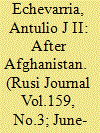

|
|
|
|
|
| Publication |
2014.
|
| Summary/Abstract |
One of the key issues to be discussed at the forthcoming NATO summit will be preparation for future military engagements after more than a decade of counter-insurgency operations in Afghanistan. Antulio J Echevarria II revisits some of the key lessons to be drawn from this experience, and highlights the questions that will need to be addressed if the Alliance is to be equipped to meet future challenges in a changing world.
|
|
|
|
|
|
|
|
|
|
|
|
|
|
|
|
| 2 |
ID:
133853
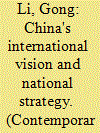

|
|
|
|
|
| Publication |
2014.
|
| Summary/Abstract |
The global order was set in place following the end of the Second World War by a consortium of western countries headed by the U. S. since then, major western countries have strived to maintain their long dominance in global politics and economics. With the rise of nationalist movements, former colonies gained their independence, and many developing countries joined the UN in recent years the economies of the emerging powers have grow rapidly and they have also joined WTO.
|
|
|
|
|
|
|
|
|
|
|
|
|
|
|
|
| 3 |
ID:
133850
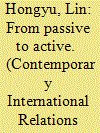

|
|
|
|
|
| Publication |
2014.
|
| Summary/Abstract |
As one of the victorious allies of World War - I, China attended the Paris Peace Conference in 1919. Toa certain extent, the conference can be regarded as the true beginning of global governance. It was followed by the establishment of the Versailles-Washington System. The first international pattern with world participation
|
|
|
|
|
|
|
|
|
|
|
|
|
|
|
|
| 4 |
ID:
133854
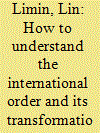

|
|
|
|
|
| Publication |
2014.
|
| Summary/Abstract |
What is the international order? Professor Zhoa Xiaochun define it as the standards and specifications established by the members of the international system in order to maintain its stability and normal operation as well coordinating and addressing international affairs, and acting as a guarantee mechanism, a decision making process and providing rules of agenda.
|
|
|
|
|
|
|
|
|
|
|
|
|
|
|
|
| 5 |
ID:
133957
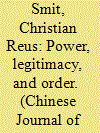

|
|
|
|
|
| Publication |
2014.
|
| Summary/Abstract |
Legitimacy is not something distinct from power; it is one of the vital sources of power. And if power shapes the nature and development of international orders, then the politics of legitimacy features prominently in the construction, maintenance, and dissolution of such orders. This article begins by exploring the concepts of power and legitimacy, their theoretical interconnection, and the impact that crises of legitimacy have on the maintenance of political power. It then takes an empirical turn, examining, however briefly, two sites in which the politics of legitimacy had a profound effect on the development of the modern international order. The first concerns the globalization of the system of sovereign states, a four-century long process of imperial extension, crisis, and fragmentation into successor states, a process in which struggles over individual rights played a key role. The second concerns the definition and distribution of special responsibilities for managing functional challenges among states. In orders characterized by formal sovereign equality, on the one hand, and imbalances of material capabilities, on the other, a mechanism needs to be found for containing and harnessing power to meet the problems faced by the international community. Historically, this has been achieved through the allocation of special responsibilities to particular states, usually great powers. But if regimes of special responsibilities create patterns of more or less formal hierarchy among states, they are also sites of intense battles over legitimacy.
|
|
|
|
|
|
|
|
|
|
|
|
|
|
|
|
| 6 |
ID:
133857
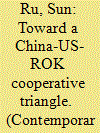

|
|
|
|
|
| Publication |
2014.
|
| Summary/Abstract |
A converging point has emerged on the horizon, with an increasing number of calls for building China-US-+X mechanism among Chinese scholars, and a veritable zeal for initiating a ROK-US-China dialogue from President park Geun-hye of South Korea. This paper intends to explore the possibility of such trilateral dialogue and cooperation arrangement, by analyzing the background to the trilateral relations, their respective stance and consideration, as well as any hurdled involved in the process.
|
|
|
|
|
|
|
|
|
|
|
|
|
|
|
|
| 7 |
ID:
133851
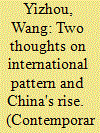

|
|
|
|
|
| Publication |
2014.
|
| Summary/Abstract |
The substantial change in the international system since the end of the World War - II has been a boon to non-western nations, which make up three quarters of all the countries today. Most nationalist, populations and countries that had little freedom and almost no voice have representation today in the United Nations and G20,and they benefit from more international investment. Enterprising BRICS countries hold a competitive position in manufacturing, infrastructure construction and international trade. Their role in international rule formations has changed from a taker to an instructor, allowing them to tread their individual development path more confidently.
|
|
|
|
|
|
|
|
|
|
|
|
|
|
|
|
| 8 |
ID:
133958
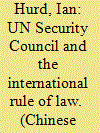

|
|
|
|
|
| Publication |
2014.
|
| Summary/Abstract |
This article considers the relationship between international law and the UN Security Council. The practical power of the Council is constituted at the intersection of its legal framing, its political legitimacy, and the interests of powerful states. This sometimes means the Council has less power than is assigned to it by the UN Charter, but it often means that it has more. It is clear that the Council sits within the international legal system, the legal limits on its action are interpreted in light of prior Council practice, and thus the meaning of 'compliance' and 'violation' of the Charter changes over time. Some transgressions of the Charter are understood as informal amendments to it; others are seen as threats to international peace and security that impel enforcement action. This ambiguity in the law and practice of the United Nations is inherent in the idea of the 'international rule of law'. The Council straddles the unstable boundary between international law and politics, both undermining and reinforcing the distinction between them.
|
|
|
|
|
|
|
|
|
|
|
|
|
|
|
|
|
|
|
|
|